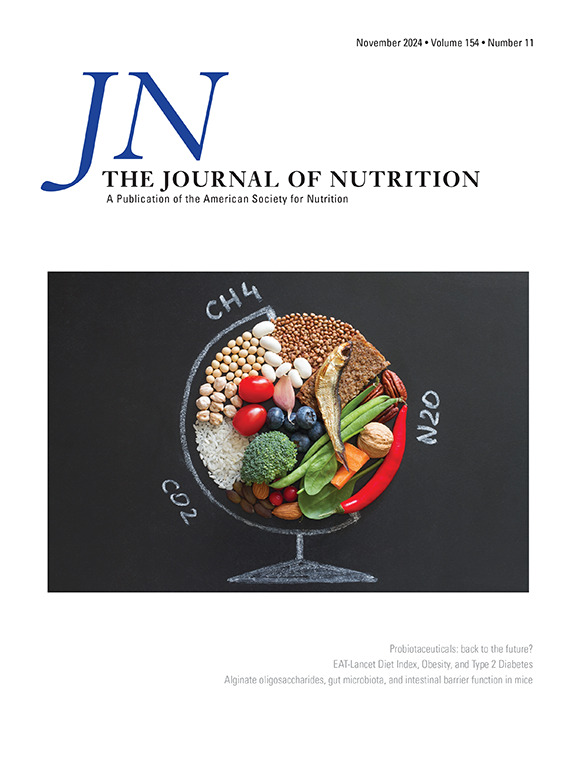Dietary Short-Chain Fatty Acids Supplementation Improves Reproductive Performance and Gut Microbiota in Gilts
IF 3.7
3区 医学
Q2 NUTRITION & DIETETICS
引用次数: 0
Abstract
Background
Short-chain fatty acids (SCFAs) have emerged as critical modulators of female reproductive function and host gut microbiota.
Objectives
This study aimed to investigate the impact of dietary SCFAs supplementation on reproductive performance and gut microbiota in gilts, and to elucidate the underlying mechanisms.
Methods
Eighty gilts (95 d old) were randomly assigned to either a control group (Ctrl, 40 gilts) receiving a basal diet, or a SCFAs treatment group (SCFAs, 40 gilts) receiving a basal diet supplemented with 0.13% sodium acetate, 0.11% sodium propionate, and 0.09% sodium butyrate. At third estrus, 13 gilts (6 from Ctrl and 7 from SCFAs) were killed for follicular development and gut microbiota analysis, whereas the remaining gilts completed gestation for reproductive performance assessment.
Results
SCFAs group had higher total number born (11.97 compared with 9.44) and total number born alive (11.28 compared with 9.34) compared with Ctrl group (P < 0.05). SCFAs group had increased counts of secondary follicles (36.14 compared with 26.83), antral follicles (10.29 compared with 6.67), and corpus luteum (25.09 compared with 19.33), alongside had reduced atretic follicles (15.32 compared with 20.67) compared with Ctrl group (P < 0.05). Proteomic analysis revealed that SCFAs-induced differentially expressed proteins (DEPs) were significantly enriched in the follicular development-related pathways (P < 0.05). Apoptosis-related DEPs positively correlated with follicular development indices (P < 0.05), consistent with the reduced apoptosis observed in ovarian granulosa cells of the SCFAs group. Additionally, SCFAs supplementation improved both the composition and alpha-diversity (P < 0.05) of gilts’ gut microbiota. Furthermore, both the SCFAs-enriched bacteria and plasma SCFAs concentrations showed positive associations with gilts’ follicular development indices (P < 0.05).
Conclusions
Dietary SCFAs supplementation enhances reproductive performance in gilts by promoting ovarian follicular maturation and optimizing gut microbiota composition.
补充膳食短链脂肪酸可改善雌性吉尔兹鱼的繁殖性能和肠道微生物区系
背景:短链脂肪酸(SCFAs)已成为女性生殖功能和宿主肠道微生物群的关键调节剂。目的:本研究旨在探讨饲粮中添加短链脂肪酸对后备母猪繁殖性能和肠道微生物群的影响,并阐明其潜在机制。方法:选取80头95日龄的后备母猪,随机分为对照组(Ctrl, 40头)和SCFAs处理组(SCFAs, 40头),分别在基础饲粮中添加0.13%醋酸钠、0.11%丙酸钠和0.09%丁酸钠。在第三期发情时,对13只后备母猪(6只来自Ctrl组,7只来自SCFAs组)实施安乐死,用于卵泡发育和肠道微生物群分析,其余后备母猪完成妊娠,用于生殖性能评估。结果:SCFAs组总出生数(11.97 vs. 9.44)和总活产数(11.28 vs. 9.34)高于对照组(P < 0.05)。与对照组相比,SCFAs组的次级卵泡(36.14 vs. 26.83)、窦卵泡(10.29 vs. 6.67)和黄体(25.09 vs. 19.33)数量增加,闭锁卵泡(15.32 vs. 20.67)数量减少(P < 0.05)。蛋白质组学分析显示,scfas诱导的差异表达蛋白(DEPs)在卵泡发育相关通路中显著富集(P < 0.05)。凋亡相关DEPs与卵泡发育指数呈正相关(P < 0.05),与SCFAs组卵巢颗粒细胞凋亡减少一致。此外,添加SCFAs提高了后备母猪肠道微生物群的组成和α多样性(P < 0.05)。此外,富集SCFAs的细菌和血浆SCFAs浓度与后备母猪卵泡发育指数呈正相关(P < 0.05)。结论:饲粮中添加SCFAs可通过促进卵巢卵泡成熟和优化肠道菌群组成来提高后备母猪的繁殖性能。
本文章由计算机程序翻译,如有差异,请以英文原文为准。
求助全文
约1分钟内获得全文
求助全文
来源期刊

Journal of Nutrition
医学-营养学
CiteScore
7.60
自引率
4.80%
发文量
260
审稿时长
39 days
期刊介绍:
The Journal of Nutrition (JN/J Nutr) publishes peer-reviewed original research papers covering all aspects of experimental nutrition in humans and other animal species; special articles such as reviews and biographies of prominent nutrition scientists; and issues, opinions, and commentaries on controversial issues in nutrition. Supplements are frequently published to provide extended discussion of topics of special interest.
 求助内容:
求助内容: 应助结果提醒方式:
应助结果提醒方式:


